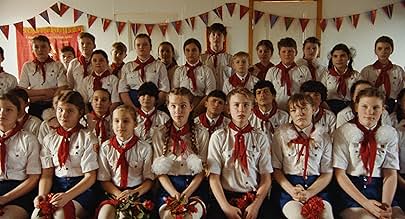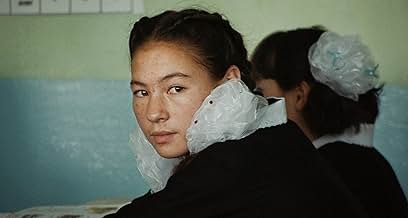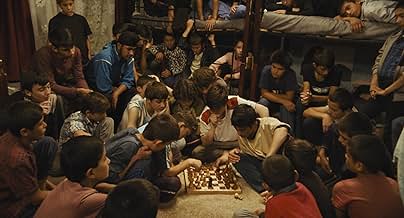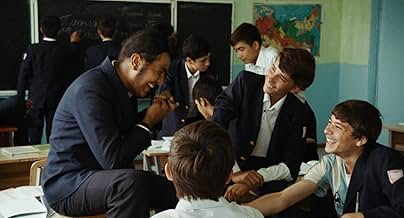NOTE IMDb
6,7/10
699
MA NOTE
Un revendeur de billets âgé de 15 ans à Kaboul rêve de Bollywood jusqu'à ce que les Soviétiques le forcent à entrer dans un orphelinat.Un revendeur de billets âgé de 15 ans à Kaboul rêve de Bollywood jusqu'à ce que les Soviétiques le forcent à entrer dans un orphelinat.Un revendeur de billets âgé de 15 ans à Kaboul rêve de Bollywood jusqu'à ce que les Soviétiques le forcent à entrer dans un orphelinat.
- Réalisation
- Scénario
- Casting principal
- Récompenses
- 1 victoire et 7 nominations au total
Avis à la une
The film is about a kid named Qodratullah who is forced to live in an orphanage by the pro-Soviet government of Afghanistan in 19189 Kabul. As soon as he arrives in the orphanage which is around 10-15 minutes in, the director lifts her focus and camera from the kid and tries instead to capture every elements in that place such as the kids, the dorms, the teachers and supervisers and so on.
This film is made based on unpublished diaries of Mr. Anwar Hashimi who also stars in this film and he lived in such a place for 8 years when he was a teenager. As a result, the main focus and star of this film is the mentioned orphanage and director Shahrbanoo Sadat reflects on Afghans culture and the country's political state at that time period as a subplot to the life in the orphanage.
The filmmakers have done their best to give us a human, sans cliche film and they have pretty much succeeded doing so. If you've got a chance to see this piece, don't miss it.
This film is made based on unpublished diaries of Mr. Anwar Hashimi who also stars in this film and he lived in such a place for 8 years when he was a teenager. As a result, the main focus and star of this film is the mentioned orphanage and director Shahrbanoo Sadat reflects on Afghans culture and the country's political state at that time period as a subplot to the life in the orphanage.
The filmmakers have done their best to give us a human, sans cliche film and they have pretty much succeeded doing so. If you've got a chance to see this piece, don't miss it.
In writer-director Shahrbanoo Sadat's second feature, a young man who daydreams of action-packed Bollywood heroics finds himself in a considerably more dangerous position in real life: that of an orphan scraping by in Kabul at the end of the 1980s, with the Soviets maintaining control as the Mujahideen fight to take their land back.
Part two of a planned five-part series that began with 2016's Wolf and Sheep - which, like this movie, premiered in Cannes' Directors' Fortnight - The Orphanage (Parwareshgah) is a small yet touching chronicle where innocent teenage boys fall prey to socio-political forces way beyond their control.
Mixing historical docudrama and make-believe, the story is not exactly a tightly knit narrative, with an observant tone that has its nonprofessional cast oscillating between scenes of harsh reality and pure film fantasy. It should play more festivals after Cannes and nab a few art house pickups abroad, especially in Europe.
Qodratollah Qadiri, who also toplined Wolf and Sheep and is poised to become Sadat's very own Antoine Doinel if the two keep working together, stars as Quodrat, a friendly streetwise teenager who makes a modest living reselling tickets to his favorite Bollywood flicks, which he himself sits and watches with wide-eyed appreciation.
When he's rounded up by the cops and sent to a public orphanage, Quodrat's life shifts from a carefree hand-to-mouth existence to a stricter hierarchy ruled by bullies and overseen by a kindhearted administrator (Sediqa Rasuli). He soon befriends a group of boys who become his roommates, including the chess master, Masihullah (Masihullah Feraji), his nephew Fayaz (Ahmad Fayaz Omani) - the uncle and nephew are both teens - and the war-obsessed Hasib (Hasibullah Rasooli).
Together, the four live through several Little Rascals-style adventures, forgetting where they are for the time being and enjoying themselves like any boys left to their own devices. Sadat mixes those scenes with Bollywood-inspired flights-of-fancy where Quodrat and his buddies lip-sync to gushy ballads or showcase the fighting skills of action superstars like Anil Kapoor. (In the press notes, the director explains how Bollywood movies were hugely popular in Kabul during the 1980s.)
But those illusions hide a grimmer truth, with one boy going mad and locked up in a wretched psych ward, and another accidentally killed by leftover ammunition stolen from a Russian tank. As much as Quodrat can imagine movies in his mind, what he sees in the real world is far scarier: a place where orphans like him seem to be expendable.
Sadat cuts a little too systematically between the reality and fantasy scenes throughout the narrative, which heads to some predictable places despite the unique setting. The most memorable thing about The Orphanage is actually not all the movie make-believe, which feels like a device used before, but rather the way it shows how life under Soviet rule could in fact be beneficial for boys in Quodrat's situation.
This is most evident in a long sequence where the orphans take a trip to a summer camp in the Soviet Union, working on their Russian (which they are already learning back in Afghanistan) and partaking in various activities, as if they were regular kids and not orphans at all. Probably the most moving shot in the entire film is one where we see Masihullah's reaction after playing computer chess for the first time and beating the machine - it's a rare victory in an otherwise depleted life.
Like Wolf and Sheep, Sadat shot the movie in Tadjikistan, mixing natural splendors with the starker institutional interiors. A grainy look makes the film feel like it was actually made in the 80s, adding to its historical authenticity. When, at the end, the orphanage risks tumbling along with the Soviet regime, you're left with the harrowing feeling that for Quodrat and his friends, it's out of the frying pan and into the fire..
Part two of a planned five-part series that began with 2016's Wolf and Sheep - which, like this movie, premiered in Cannes' Directors' Fortnight - The Orphanage (Parwareshgah) is a small yet touching chronicle where innocent teenage boys fall prey to socio-political forces way beyond their control.
Mixing historical docudrama and make-believe, the story is not exactly a tightly knit narrative, with an observant tone that has its nonprofessional cast oscillating between scenes of harsh reality and pure film fantasy. It should play more festivals after Cannes and nab a few art house pickups abroad, especially in Europe.
Qodratollah Qadiri, who also toplined Wolf and Sheep and is poised to become Sadat's very own Antoine Doinel if the two keep working together, stars as Quodrat, a friendly streetwise teenager who makes a modest living reselling tickets to his favorite Bollywood flicks, which he himself sits and watches with wide-eyed appreciation.
When he's rounded up by the cops and sent to a public orphanage, Quodrat's life shifts from a carefree hand-to-mouth existence to a stricter hierarchy ruled by bullies and overseen by a kindhearted administrator (Sediqa Rasuli). He soon befriends a group of boys who become his roommates, including the chess master, Masihullah (Masihullah Feraji), his nephew Fayaz (Ahmad Fayaz Omani) - the uncle and nephew are both teens - and the war-obsessed Hasib (Hasibullah Rasooli).
Together, the four live through several Little Rascals-style adventures, forgetting where they are for the time being and enjoying themselves like any boys left to their own devices. Sadat mixes those scenes with Bollywood-inspired flights-of-fancy where Quodrat and his buddies lip-sync to gushy ballads or showcase the fighting skills of action superstars like Anil Kapoor. (In the press notes, the director explains how Bollywood movies were hugely popular in Kabul during the 1980s.)
But those illusions hide a grimmer truth, with one boy going mad and locked up in a wretched psych ward, and another accidentally killed by leftover ammunition stolen from a Russian tank. As much as Quodrat can imagine movies in his mind, what he sees in the real world is far scarier: a place where orphans like him seem to be expendable.
Sadat cuts a little too systematically between the reality and fantasy scenes throughout the narrative, which heads to some predictable places despite the unique setting. The most memorable thing about The Orphanage is actually not all the movie make-believe, which feels like a device used before, but rather the way it shows how life under Soviet rule could in fact be beneficial for boys in Quodrat's situation.
This is most evident in a long sequence where the orphans take a trip to a summer camp in the Soviet Union, working on their Russian (which they are already learning back in Afghanistan) and partaking in various activities, as if they were regular kids and not orphans at all. Probably the most moving shot in the entire film is one where we see Masihullah's reaction after playing computer chess for the first time and beating the machine - it's a rare victory in an otherwise depleted life.
Like Wolf and Sheep, Sadat shot the movie in Tadjikistan, mixing natural splendors with the starker institutional interiors. A grainy look makes the film feel like it was actually made in the 80s, adding to its historical authenticity. When, at the end, the orphanage risks tumbling along with the Soviet regime, you're left with the harrowing feeling that for Quodrat and his friends, it's out of the frying pan and into the fire..
Wonderful, a six-handed production (countries) that social criticism we love, bathing in history, a sad time the takeover of Afghanistan by the Soviets, called the War in Afghanistan (1979-1989), and the outcome, the film, could not to be different, the tragedy, the sadness, the defeat, and the interrupted ending, of the unspoken drama...
Innovative and delicate film on the lives of poor boys in Afghanistan who have been sent to an orphanage. Through their eyes spectator sees dramatic changes in Afghanistan, from Soviet influence until the emergence of religious fundamentalism. The movie does not avoid the serious particular problems of each moment. Besides the social and political issues, I shall also highlight that the main character among those boys used to illegally re-sell movie theatre tickets, and loves cinema. Therefore, one of the most special elements of the film is how, during harsh episodes, his mind brings back the Bollywood scenes he loves in a way of making reality nicer and softer in a day-dreaming illusion.
The Orphanage is a stellar film conveying the need for true heartfelt cinematic experiences. Beautiful cinematography creates a transcendent movie experience, with a script based on the unpublished diaries of Anwar Hashim, who plays a supporting role in the film. Acclaimed director Shahrbanoo Sadat uses personal experiences to convey an uplifting message.
Wolf and Sheep, the prequel to The Orphanage, premiered in 2016. Like its predecessor, The Orphanage is based on real life experiences in Afghanistan. The movie chronicles the main character, Qodrat (Qodratollah Qadiri), who spends his days trying to survive by illegally selling overpriced movie tickets and key rings. He is then brought to a Russian-operated orphanage along with other teenage boys, where he is given the opportunity to get an education alongside his peers. The Orphanage details his experiences in the orphanage and how the quarrels between roommates of the dorms are dealt with by the director Anwar (Anwar Hashimi). All throughout a war torn country in 1989, Qodrat remains hopeful, through fantasy sequences shared with the audience.
The cinematography is what truly stands out in this film. Directory of photography, Virginie Surdej captures the beauty of the country while adding to the heartbreaking story. My favorite part of this movie is the performances by the young people, including Qodratollah Qadiri, who gives rare insight into real life in Afghanistan, as they are all natives of the country.
The message of this film is about the importance of hope, despite all circumstances. The protagonist, Qodrat, remains hopeful and looks for positive routes of escapism throughout his struggles of growing up without a family, and his struggles at the orphanage. You should be aware that the film contains strong language and minor adult content. There are also two graphic descriptions of war and violence. There is also some references to sex and pornographic images (very far away from the screen, but still visible) that are unsuitable for younger kids.
I give The Orphanage 4 out of 5 stars and recommend it for ages 15 to 18, plus adults. Reviewed by Erin M., KIDS FIRST!
Wolf and Sheep, the prequel to The Orphanage, premiered in 2016. Like its predecessor, The Orphanage is based on real life experiences in Afghanistan. The movie chronicles the main character, Qodrat (Qodratollah Qadiri), who spends his days trying to survive by illegally selling overpriced movie tickets and key rings. He is then brought to a Russian-operated orphanage along with other teenage boys, where he is given the opportunity to get an education alongside his peers. The Orphanage details his experiences in the orphanage and how the quarrels between roommates of the dorms are dealt with by the director Anwar (Anwar Hashimi). All throughout a war torn country in 1989, Qodrat remains hopeful, through fantasy sequences shared with the audience.
The cinematography is what truly stands out in this film. Directory of photography, Virginie Surdej captures the beauty of the country while adding to the heartbreaking story. My favorite part of this movie is the performances by the young people, including Qodratollah Qadiri, who gives rare insight into real life in Afghanistan, as they are all natives of the country.
The message of this film is about the importance of hope, despite all circumstances. The protagonist, Qodrat, remains hopeful and looks for positive routes of escapism throughout his struggles of growing up without a family, and his struggles at the orphanage. You should be aware that the film contains strong language and minor adult content. There are also two graphic descriptions of war and violence. There is also some references to sex and pornographic images (very far away from the screen, but still visible) that are unsuitable for younger kids.
I give The Orphanage 4 out of 5 stars and recommend it for ages 15 to 18, plus adults. Reviewed by Erin M., KIDS FIRST!
Le saviez-vous
- ConnexionsFeatures Shahenshah (1988)
Meilleurs choix
Connectez-vous pour évaluer et suivre la liste de favoris afin de recevoir des recommandations personnalisées
- How long is The Orphanage?Alimenté par Alexa
Détails
- Date de sortie
- Pays d’origine
- Langues
- Aussi connu sous le nom de
- L'orphelinat
- Lieux de tournage
- Allemagne(location)
- Sociétés de production
- Voir plus de crédits d'entreprise sur IMDbPro
- Durée1 heure 30 minutes
- Couleur
- Rapport de forme
- 1.85 : 1
Contribuer à cette page
Suggérer une modification ou ajouter du contenu manquant

Lacune principale
By what name was L'Orphelinat (2019) officially released in Canada in English?
Répondre














